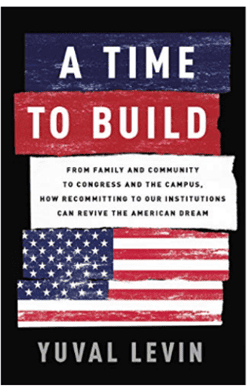By Jim Heffernan
Maybe I’m hanging out with the wrong people, but it seems all the books I’ve been attracted to lately seem to express great ideas but are not easy to read. I like to review books because I want to promote reading and to promote important ideas. I just wish more people with Ph.D. after their name could learn to write more like George Orwell or Jack London.
The author, Yuval Levin, is a conservative political analyst who worked for George W. Bush and the American Enterprise Institute. I think he has wonderful and original ideas. I wish his style was a little less academic, and the whole book were written as clearly as his 6-page conclusion.
The central idea I got out of the book was that much of the change in our society has come from a deterioration of our institutions as listed in the title, “from family and community to congress and the campus”. I mark the loss of respect for institutions in my lifetime by the shift from of one president saying in 1960, “Ask what you can do for your country.” and ,20 years later, another president saying, “Government is not the solution, it’s the problem.”
Levin introduced me to terms that I think are very relevant to our present-day difficulties: “insiderism”, “outsiderism”, “formative”, and “performative”. I agree with his view that all four of these terms are relevant to what has become of institutions.
“Insiderism” is when people within an institution attempt to shield an institution from discredit by concealing or denying wrongdoing. The Catholic Church and the Boy Scouts have lost credibility because of “insiderism”. The truth inevitably emerges, but the reputation of the institution suffers.
“Outsiderism” is when people seek control of an institution by posing as an “outsider”. How ironic is it that so many politicians seek control of an institution with promises to clean it up or “drain the swamp”.
In the past, institutions were valued by their “formative” influence. If we were a member of an institution, the goals and ideals of the institution molded our views and our statements. It was the same whether it was the Presidency or the U.S. Senate. The institution was “formative”. It molded you and tempered your actions so that you could preserve the dignity of the institution and further the goals of the institution.
Today, institutions seem to be used mainly for their “performative” potential. The ideals of the Presidency or the Senate are cast aside for the ability to use the institution as a platform to attract attention and notoriety. The institution has become “performative”. I think that if we talked more about “performative” politics we might have less of it; the poor performances of our State and Federal legislatures recently is a prime example of performative politics.
If you’re not ready for a serious read, I would recommend listening to Levin on NPR (https://www.npr.org/transcripts/800922222) or on You Tube or TED talks. Maybe if you start the book by reading the conclusion first it would be an easier read. I very much agree with the author that if we replaced our cynicism of our institutions with devotion to them we would be much better off. I think his last sentence in the book perfect.
“That, in the end, is the character of the transformation we need. The demolition crews have for too long been allowed to define the spirit of this era in America. But where we’re headed will be up to the builders and rebuilders. And that is what we each should seek to be.”
As always, book review is strictly my opinion and I welcome discussion at codger817@gmail.com
205 Pages, Published Jan. 22, 2020 Available at Cloud and Leaf Bookstore, Manzanita and Tillamook Public Library
Goodreads 4.02 out of 5, 566 ratings


.png)
 (1).png)